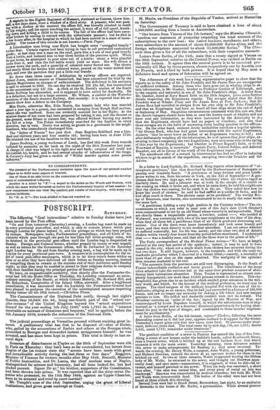The Athenaeum of this week has a long argumentative paper
to show that the reports as to the safety of Sir John Franklin and Sir James Ross are unsupported by sufficient evidence. Among those who have gone out in whaling ships to ob- tain information, is Mr. Goodall-, brother to Professor Goodsir of Edinburgh, and to the surgeon and naturalist in one of Sir John Franklin's ships. A letter from Mr. Goodsir, dated at Navy Board Inlet on the 10th August, gives some further details respecting the Esquimaux reports. The savages stated that Sir John Franklin was at Whaler Point and Sir James Ross at Port Jackson ; that Sir James Ross had travelled in sledges from his own ship to Sir John Franklin's; and that an Esquimaux had been on board all four ships about the end of April or beginning of blay. Suspicious circumstances connected with this tale are, that the Arctic voyagers should have been so near the known resort of whalers and not have sent any information, as they were instructed by the Admiralty to do; that the Esquimaux should have had no papers or vouchers; and also that those savages are in the habit of answering every leading question in the affirma- tive. On the other hand, eminent Arctic authorities entertain a hopeful opinion. " Sir George Back, who has had great intercourse with the native Esquamaux, declares that he never knew en Indian or an Esquimaux tracing to fail ; and after deliberately weighing all the information, be is of opinion that four ships, an- swering to those composing the two Expeditions, were seen some time in the spring of this year by the Esquimaux ; but whether m Prince Regent's Inlet, or to the Westward of Boothia, is uncertain: Captain Parry, Colonel Sabine, and Admiral Beaufort, are all in favour of the truth of the Esquimaux report." The munificent offer of a reward by Government has bad no effect in inducing whalers to go in search of the expedition, excepting two—the Truelove and the Advice.


























 Previous page
Previous page